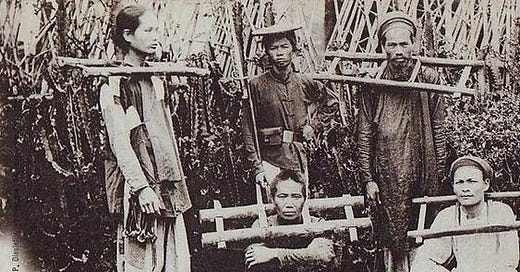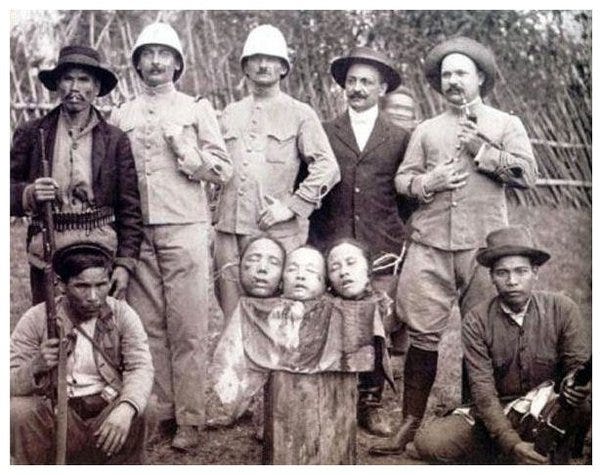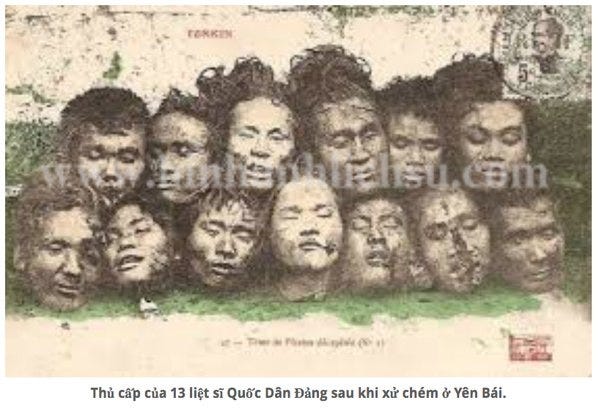In the grand tapestry of world history, certain threads run deeper, casting long shadows that continue to shape the present. One such thread is the era of French colonial rule in Vietnam, a period that left an indelible mark on the nation’s cultural, political, and social landscape.
From the late 18th century to the mid-20th century, Vietnam found itself under the yoke of French colonial power. This was a time of severe exploitation and numerous atrocities, a time when the rich culture and history of Vietnam were suppressed, and its resources plundered for foreign gain.
Yet, it was also a time that bore witness to the extraordinary resilience and determination of the Vietnamese people. Their struggle for independence against overwhelming odds is a testament to the enduring spirit of humanity.
Understanding this part of history is crucial. It not only sheds light on the roots of modern-day Vietnam but also offers valuable insights into the broader impacts of colonialism. As we delve into this often-overlooked chapter of history, we uncover stories of resilience, resistance, and the relentless pursuit of freedom that continue to resonate today. This is the untold story of Vietnam’s colonial past.
The Onset of French Colonial Rule
As the sun began to set on the 18th century, a new power was rising in the East. The French, driven by a potent mix of ambition and desire, turned their gaze towards Vietnam. This marked the beginning of a chapter that would forever alter the course of Vietnam’s history.
The French interest in Vietnam was sparked by a multitude of factors. The allure of overseas markets and the promise of a larger share of Asian territories were significant motivators. The age was one of exploration and expansion, and Vietnam, with its rich resources and strategic location, presented an attractive prospect.
However, the motivations behind French colonization were not purely economic. There was also a cultural and religious dimension to it. The French saw themselves as the bearers of civilization, tasked with the mission of spreading their culture and religion. This ‘mission civilisatrice’ or ‘civilizing mission’ was a key justification for their colonial endeavors.
The French began their colonial rule in earnest in 1859, when they established control over Saigon. This marked the onset of a brutal regime that would exploit the resources of Vietnam, suppress its culture, and commit numerous atrocities.
Yet, even as the French tightened their grip on Vietnam, the seeds of resistance were being sown. The Vietnamese people, despite being under the yoke of foreign rule, never lost their spirit. Their resilience in the face of adversity and their determination to fight for their freedom would light the spark of a struggle that would eventually lead to their independence.
The onset of French colonial rule in Vietnam is a testament to the complex interplay of economic, cultural, and political factors that drive the course of history. It serves as a stark reminder of the impacts of colonialism and the indomitable spirit of those who resist it.
The Reality of French Colonial Rule
The reality of French colonial rule in Vietnam was a stark contrast to the romanticized vision of a ‘civilizing mission’. It was a period marked by the ruthless exploitation of resources, the systematic suppression of Vietnamese culture, and a litany of human rights abuses and atrocities.
Vietnam, with its rich natural resources, was seen as a treasure trove by the French colonizers. The fertile lands were seized for plantation agriculture, with rubber, tea, and coffee being the primary crops. The mines were exploited for coal, tin, and zinc. The forests were stripped bare for timber. The Vietnamese people were reduced to cheap labor, working under harsh conditions for meager wages. The fruits of their labor were siphoned off to feed the French economy, leaving the local population in a state of chronic poverty and deprivation.
The suppression of Vietnamese culture was another grim aspect of French colonial rule. The French sought to impose their language, religion, and cultural norms on the Vietnamese people. Schools were established to teach the French language and propagate French culture. Vietnamese traditions and customs were derided as ‘primitive’ and ‘backward’. The aim was to create a class of ‘assimilated’ Vietnamese who would serve the interests of the French colonial regime.
But perhaps the most egregious aspect of French colonial rule was the widespread human rights abuses and atrocities. Arbitrary arrests, torture, and extrajudicial killings were commonplace. The infamous ‘guillotine law’ allowed for the execution of anyone found guilty of resisting French rule. The use of forced labor, often under brutal conditions, was widespread. The indigenous population was subjected to a regime of fear and intimidation, designed to quell any form of resistance.
Yet, despite the harsh realities of French colonial rule, the Vietnamese people refused to be broken. Their spirit remained unbroken, their resolve unshaken. They resisted the exploitation, fought against the cultural suppression, and stood up against the human rights abuses. Their struggle for freedom and independence would eventually bear fruit, leading to the end of French colonial rule and the birth of a new Vietnam.
The reality of French colonial rule in Vietnam is a sobering reminder of the dark side of colonialism. It underscores the importance of remembering this part of history, not just for the sake of the Vietnamese people, but for all of humanity. For it is only by acknowledging the mistakes of the past that we can hope to avoid repeating them in the future.
The Resilience of the Vietnamese People
In the face of the harsh realities of French colonial rule, the Vietnamese people demonstrated an extraordinary spirit of resistance. This spirit was not born out of the blue, but was deeply rooted in their rich history and culture. It was a testament to their indomitable will and their unwavering belief in the ideals of freedom and self-determination.
The Vietnamese people resisted the exploitation of their resources, stood up against the suppression of their culture, and fought back against the human rights abuses. They refused to be silenced, refused to be broken. Their resistance took many forms - from subtle acts of defiance to open rebellions.
The struggle for independence was a long and arduous journey. It was a journey marked by countless sacrifices and immense courage. Despite the odds stacked against them, the Vietnamese people never lost sight of their goal. They rallied under the banner of freedom, united in their resolve to break free from the shackles of colonial rule.
This struggle culminated in the First Indochina War, a brutal conflict that pitted the Vietnamese people against the might of the French colonial power. The war ended with the Geneva Accords in 1954, leading to the partition of Vietnam into North and South, and marking the end of French colonial rule.
The resilience of the Vietnamese people is a shining beacon in the annals of history. It serves as a powerful reminder of the strength of the human spirit and the enduring quest for freedom. It is a testament to the fact that no matter how great the adversity, the will of the people cannot be suppressed. Their spirit of resistance and their struggle for independence continue to inspire people around the world today.
The First Indochina War and the End of French Rule
The struggle for independence reached its climax with the outbreak of the First Indochina War. This was a brutal conflict that pitted the indomitable spirit of the Vietnamese people against the might of the French colonial power.
The war was a testament to the resilience and determination of the Vietnamese people. Despite being outgunned and outnumbered, they fought with unwavering courage and resolve. Their guerilla tactics and intimate knowledge of the local terrain proved to be a formidable challenge for the French forces.
The war raged on for eight long years, leaving a trail of devastation in its wake. But the Vietnamese people refused to be broken. Their spirit remained unbroken, their resolve unshaken. They fought on, fueled by their dream of a free and independent Vietnam.
The war finally came to an end with the signing of the Geneva Accords in 1954. The accords marked the end of French colonial rule and led to the partition of Vietnam into North and South. The North was to be governed by the communist Viet Minh, while the South was to be under the control of the State of Vietnam.
The end of French rule was a momentous event in the history of Vietnam. It marked the end of a dark chapter and the beginning of a new era. But the scars of colonial rule remained, serving as a stark reminder of the harsh realities of colonialism.
The First Indochina War and the end of French rule are pivotal events in the history of Vietnam. They serve as a testament to the resilience and determination of the Vietnamese people and their unwavering pursuit of freedom and independence.
The Lasting Impact of French Colonial Rule
The end of French colonial rule in Vietnam did not mean the end of its influence. The scars of this brutal period are still visible today, serving as a stark reminder of the harsh realities of colonialism.
The exploitation of resources during the French rule left a lasting impact on Vietnam’s economy and environment. The shift to plantation agriculture led to significant changes in land use patterns, many of which persist to this day. The extraction of minerals depleted the country’s natural resources, leaving a legacy of environmental degradation.
The suppression of Vietnamese culture during the colonial period also had long-term effects. Despite the French efforts to impose their language and culture, the Vietnamese people held onto their traditions and customs. Today, Vietnam is a vibrant blend of indigenous cultures and French influences, evident in everything from architecture to cuisine.
Perhaps the most enduring legacy of French colonial rule is the spirit of resistance it ignited among the Vietnamese people. The struggle for independence fostered a strong sense of national identity and a deep-seated desire for self-determination. This spirit continues to shape Vietnam’s political and social landscape.
The human rights abuses and atrocities committed during the French rule have left deep psychological scars. They serve as a grim reminder of the dark side of colonialism and underscore the importance of human rights and social justice.
The lasting impact of French colonial rule in Vietnam is a testament to the resilience and determination of the Vietnamese people. Despite the hardships and challenges, they have managed to rise above their colonial past and chart their own course towards a brighter future. Their story is a powerful reminder of the indomitable spirit of humanity and the enduring quest for freedom and independence.
Conclusion
In the annals of history, the French colonial rule in Vietnam stands as a stark reminder of the harsh realities of colonialism. It was a period marked by exploitation, cultural suppression, and human rights abuses.
Yet, it was also a time that bore witness to the extraordinary resilience and determination of the Vietnamese people. Their struggle for independence against overwhelming odds is a testament to the enduring spirit of humanity.
As we remember this part of history, we are reminded of the importance of freedom, the value of cultural diversity, and the indomitable spirit of the human will.
Reading list 📖
"Vietnam: A History" by Stanley Karnow
"The Colonial Bastille: A History of Imprisonment in Vietnam, 1862–1940" by Peter Zinoman
"A History of Vietnam: From Hong Bang to Tu Duc" by Oscar Chapuis
"Revolutionary Ideas: An Intellectual History of the French Revolution from The Rights of Man to Robespierre" by Jonathan Israel








